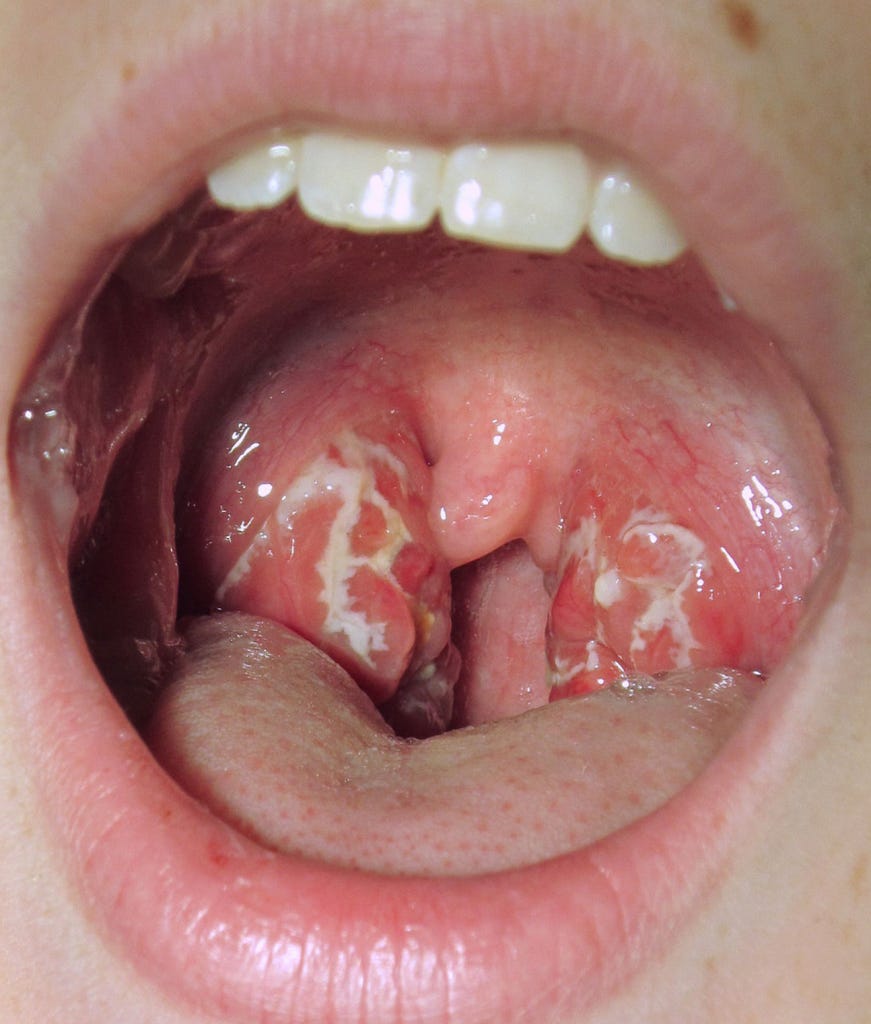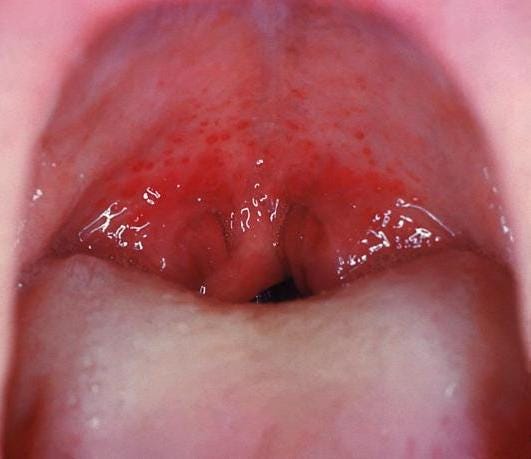New back to school recommendations for strep throat!
Many years ago I heard about research showing that throat cultures clear within 12 hours after the first dose of antibiotic for strep throat. I've been waiting since then for a change to our recommendation that kids must stay home from school for 24 hours after starting antibiotics. Guess what? The new Red Book (an infectious disease book from the American Academy of Pediatrics) is out and the back to school recommendations for strep throat have changed! This can help many parents get back to work when their kids can return to school and daycare earlier. But it doesn't mean you should rush in to demand antibiotics for every sore throat!
I have summarized the Clinical Practice Guideline for the Diagnosis and Management of Group A Streptococcal Pharyngitis: 2012 Update by the Infectious Diseases Society of America previously. These official guidelines have not been updated, but the Red Book represents the AAP official recommendations.
What is Strep throat?
Strep throat is not just any sore throat. Many viruses can cause sore throats but strep throat is caused by group A Streptococcus bacteria, also known as Streptococcus pyogenes.
Strep throat is not common in kids under 3 years. The incidence of strep throat peaks in young childhood and is less common in teens and adults.
A strep test is needed to diagnose strep throat in kids. Physicians and other healthcare providers can use Centor Criteria for adults, but a clinical diagnosis alone is not recommended in children.
Strep throat typically causes a sore throat, fever, swollen tonsils, and swollen lymph nodes (gland) under the jaw. Some kids will get a sandpapery rash on their trunk. When this happens, it is called scarlet fever. I also see a significant number of kids who get a stomach ache and vomiting with strep.

Does strep throat need to be treated?
Most parents and kids want antibiotic treatment so that the miserable symptoms of strep go away faster, but do we need to treat strep?
You might be surprised, but antibiotics are not prescribed to treat strep throat symptoms. Antibiotics are used to prevent serious complications from the strep bacteria. Pain relievers, such as acetaminophen or ibuprofen, can be used to treat the fever and sore throat symptoms. School aged children, teens, and adults can also use throat lozenges for sore throats. (Do not use these in kids who are still at risk of choking.)
So the simple answer is we don't always need to treat strep with antibiotics. In the days before antibiotics, most people got better. Even now there are some people who don't go to a clinic when they're sick, so they recover on their own.
Use antibiotics wisely
There are a lot of reasons to use antibiotics only when necessary.
One major reason is to help delay antibiotic resistance.
Some people have allergic reactions or side effects to antibiotics, so we should not use them lightly.
They also can increase total healthcare costs. Although penicillin and amoxicillin (which are recommended for strep throat) are inexpensive, treating strep throat does increase healthcare costs. The sheer number of illnesses that present to clinics for evaluation, the cost of testing, and the cost of the treatments can all add up. Of course, returning to work a day earlier can make an impact on our economy as well.
If your child has symptoms not characteristic for strep and is not otherwise high risk, you can monitor and treat for a few days at home.
But antibiotics make us feel better faster, right?
Antibiotics tend to shorten the symptoms by about 16 hours.
They have been shown to prevent serious consequences of strep infections, but those are rare, so the risk/benefit ratio may not support treating every case of strep. (Though I still do treat strep when I see it.)
Look at risk/benefit ratio for all treatments
If you want to read an example of the risks/benefits of treating strep throat, see this (slightly technical) case report.
Remember that this report simply highlights one case, it cannot be generalized to everyone with strep throat. It shows how doctors work through the risks and benefits with everything we treat. We don't always state things like this out loud, but they go through our mind as we develop treatment plans.
It's common in medicine to have case reviews such as this. Any one case does not change our treatment guidelines, but they can help us start to understand issues. They often serve to initiate further studies.
Are there risks to not treating?
Untreated Strep infections can lead to complications.
The character Beth in the classic book "Little Women" died of heart complications after scarlet fever.
(If nostalgia hits you, you can get the entire series of the March family on Kindle for less than a dollar!)
Complications from untreated strep can include tonsil abscesses, ear infections, sinus infections, arthritis, heart damage, and kidney damage. While some of these can be severe, thankfully the more severe complications are rare, even without treatment.
There is also a condition called PANDAS (pediatric autoimmune neuropsychiatric disorders) that some experts think is related to strep. This can involve the sudden onset or worsening of tic disorders, obsessive compulsive disorder, mood changes, and change in quality of school work. Throat swabs can be normal, but a blood test can help to identify a recent strep exposure. Testing is not recommended for everyone with tics or OCD, but talk to your pediatrician if symptoms start out of the blue and you're concerned.
Don't let the new recommendations make you rush in...
Strep throat is rarely an emergency. Don't rush to the ER after business hours to have your child checked as soon as you notice symptoms. You can use pain relievers as well as cold drinks, smoothies and popsicles to manage the symptoms at home initially. Just because the back to school recommendations for strep throat allow return 12 hours after antibiotics start, coming in too soon might not help in the long run.
About the testing available:
Do not use telehealth to get your sore throat treated.
In children it is not recommended to diagnose strep throat without a throat swab test. This should be done in a medical clinic to avoid inaccurate testing.
Treating early in the course might diminish the opportunity for your body to fight strep off the next time it's exposed. Yes, treating may allow a return to work, school or daycare in 12 hours, but if you can prevent the next occurrence (of course no guarantees...) wouldn't you want to?
When should you not test or treat?
Kids under 3 years old
Strep throat is not common in kids under 3 , so it's not recommended to test them.
I admit that if an older sibling or caregiver has strep and they have strep symptoms, I will test 2-3 year olds. The recommendation is to not bother. Even if they have strep, treating does not tend to alter their course. Kids in this age group tend to not develop the severe consequences of strep like older kids, even when not treated.
Viral symptoms
Although both viruses and strep bacteria can cause fever and sore throat, there are clues that it is not strep. When strep carriers get sick, they can have a false positive throat culture. The strep that shows on testing is not the cause of their symptoms and leads to over treatment.
If there is a cough or runny nose, the sore throat is most likely a viral illness. A strep test is not recommended.
When there are blisters in the mouth or a characteristic hand, foot, mouth rash, they have a viral illness. A strep test is not recommended.
Recent Strep
Because the rapid strep test looks at antigens the body makes in response to strep and not the bacteria itself, recent strep can affect rapid strep testing. The antigen can remain in the throat for a time after treatment, so a strep culture is recommended for several weeks after treatment of strep throat.
It is not recommended to do a throat culture after treatment unless a person is high risk for complications, such as rheumatic fever.
Contacts of someone with Strep
It isn't recommended to test people who have been exposed to strep unless they have symptoms. If they do not have symptoms, a positive test is more likely to be a falsely positive (not true) test. It could lead to unnecessary antibiotics.
If a sibling over 3 years of age develops symptoms, it is recommended to test and not just treat.
Pets?
Pets do not get strep, so no need to swab your pet!
Why not just test every sore throat?
Studies show that 1 in 4 kids can have strep in their throat at any given time. They are simply carriers, but not truly infected with strep. Contrary to popular belief, strep carriers are not likely to spread strep infections.
If a strep carrier has a viral illness, they can have a positive test but the strep is not the cause of their illness. Antibiotics are not needed for this at all. A positive test leads to using antibiotics that are not needed, which can increase the risk of side effects and allergic reactions. They give a false sense of security of treatment, but if it's a viral illness, antibiotics are not treating anything. Kids can be sent back to daycare or school while still contagious simply because they're "being treated."
"My child always has a negative rapid test but the culture is positive. Can't we just treat?"
My back to school recommendations for strep throat:
If your child has some of the symptoms of strep (sore throat, fever, tender bumps in the neck, vomiting, or rash) consider strep throat.
Symptoms of typical viral illnesses make strep less likely. These might include runny nose, cough, red goopy eyes, or diarrhea. No testing is recommended.
It can be difficult to tell if a runny nose from allergies despite the strep throat or if the runny nose is part of the viral illness that includes a sore throat, so if in doubt, bring your child in for evaluation. The doctor can determine if testing should be done. Do not use telehealth for this. I recommend seeing your primary care physician during normal business hours.
If there is strep throat, penicillin or amoxicillin are the preferred treatments unless there is documented allergy.
Your child may return to school 12 hours after the first dose of antibiotic if they are otherwise well. (If they are not feeling great, they likely have something else going on!)
Thank you!
Thanks to Dr. Kathy Cain of Topeka Pediatrics for some helpful editing tips!






